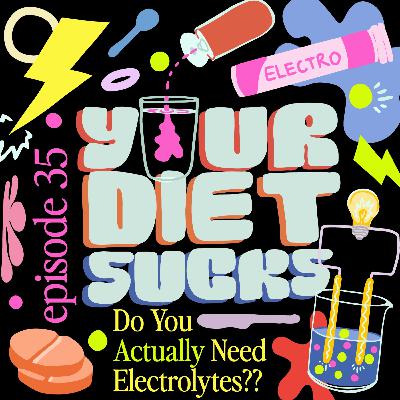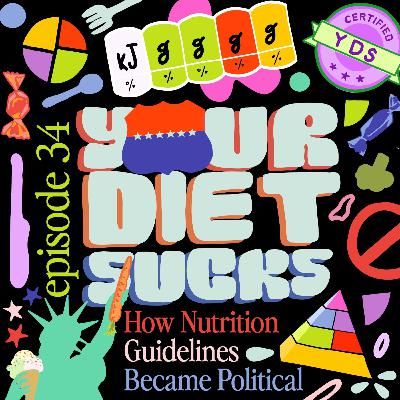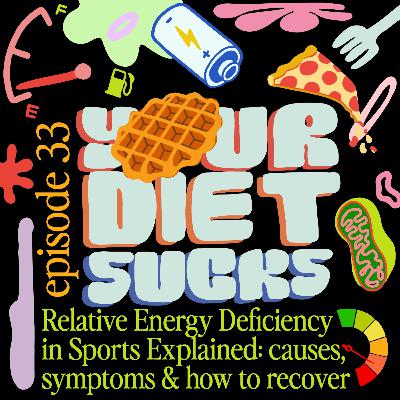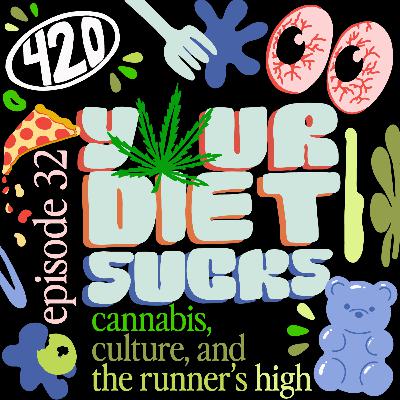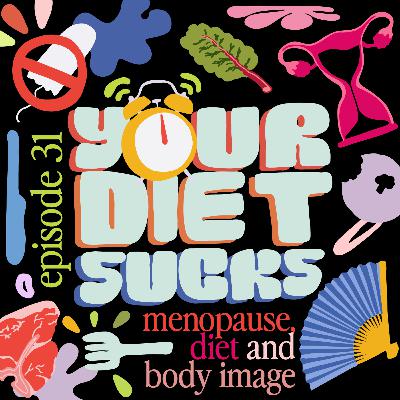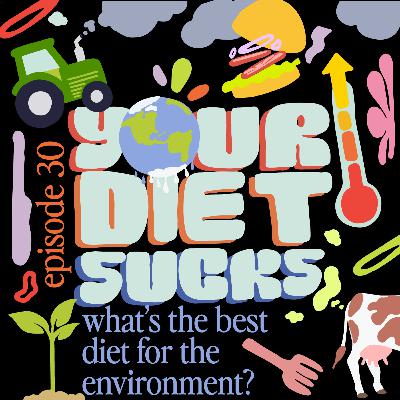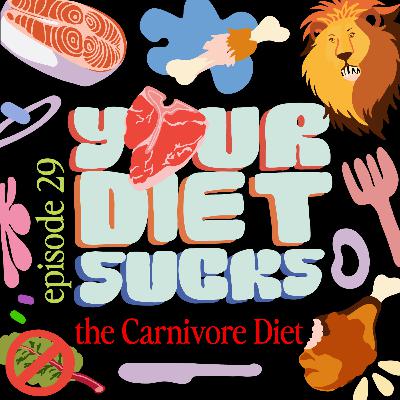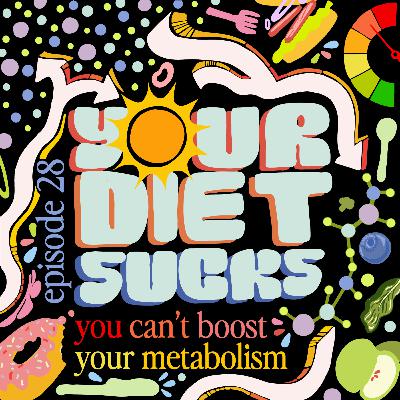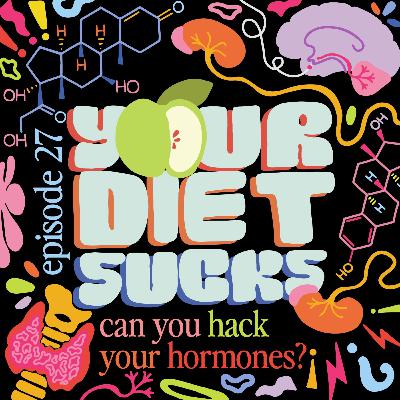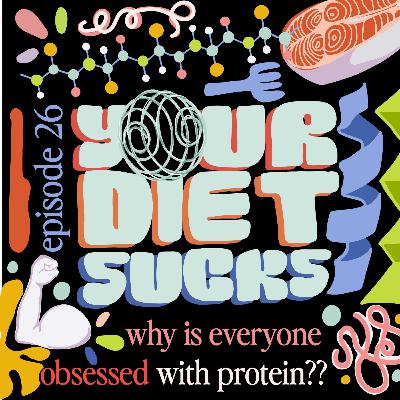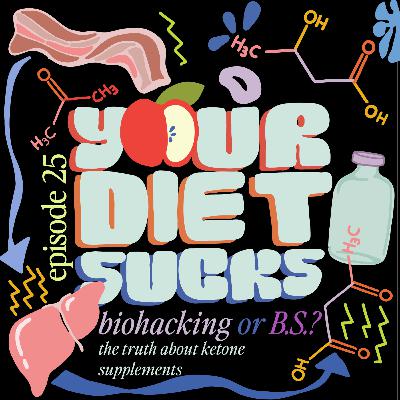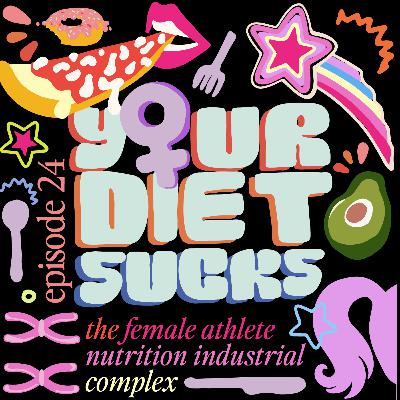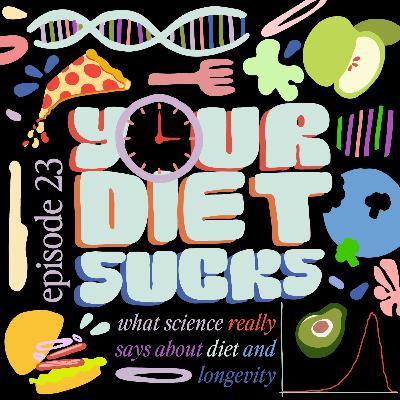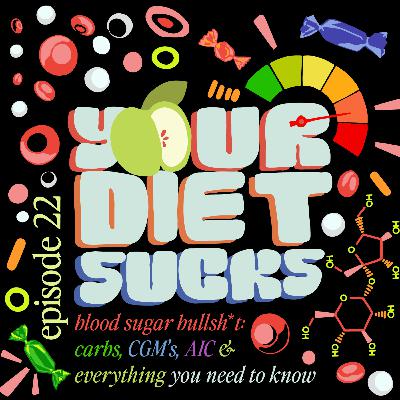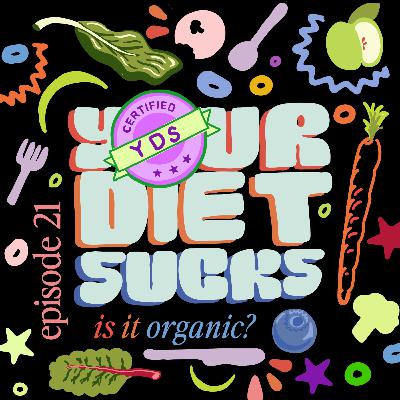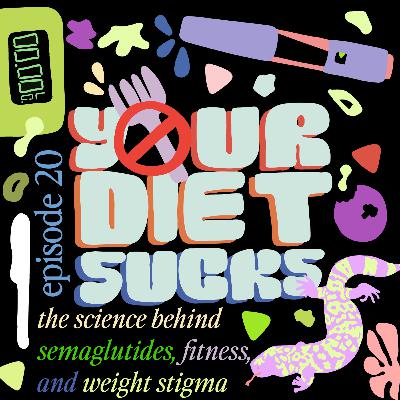Discover Your Diet Sucks
Your Diet Sucks

Your Diet Sucks
Author: Zoë Rom
Subscribed: 93Played: 2,792Subscribe
Share
© Zoë Rom
Description
Diet culture, you've met your scientific match. Hosted by an elite ultrarunner/journalist and a registered dietitian, Your Diet Sucks dismantles the myths, trends, and pseudoscience that screw up how we think about food, health, and fitness.
Subscribe to bonus episodes here: https://creators.spotify.com/pod/profile/microcosm-coaching0/subscribe
Subscribe to bonus episodes here: https://creators.spotify.com/pod/profile/microcosm-coaching0/subscribe
42 Episodes
Reverse
Support the show and get bonus content! Join the N of One Club on Patreon for bonus episodes, monthly blogs, and a community of people who also think the wellness industry is full of shit. Starting at just $3/month.Do you really need that $5 mojito-flavored electrolyte packet to survive your morning Zoom meeting? Spoiler: probably not.This week we're talking salt. From ancient Romans literally getting paid in it to the absolute shitshow that was the 1904 Olympic marathon (two water stations for 26 miles—Google it). Kylee breaks down what electrolytes actually are and who actually needs supplemental sodium (endurance athletes sweating buckets) versus who doesn't (everyone sitting at a desk).We cover sweat tests, sodium replacement strategies, and the deeply annoying fact that the symptoms of too much sodium and too little sodium are basically identical. Plus: the explosion of boutique electrolyte brands, IV drip bars, and why everyone has an emotional support Stanley cup. The wellness industry wants to sell you a crisis and then the cure, and electrolytes are having a serious moment.This episode is brought to you by:Osmia – Science-backed skincare. Use code YDS20 at osmiaskincare.comTailwind Nutrition – Endurance fuel that won't wreck your stomach. Code YOURDIET20 at tailwindnutrition.comMicrocosm Coaching – Sports dietitians who understand endurance athletes. microcosmcoaching.comJanji – Running gear with purpose. Code YDS at janji.com
Support us on Patreon!Get YDS tees, mugs, hats and more on Tee Public!This week on Your Diet Sucks, Zoë and Kylee dive headfirst into the messy, fascinating world of food policy, the history, politics, and corporate influence that quietly shape what ends up on your plate. From the creation of the first dietary guidelines to the low-fat craze that reshaped grocery store shelves, we unravel how government agencies, industry lobbyists, and “expert” committees turned nutrition advice into a political negotiation.Tailwind → tailwindnutrition.com, code YOURDIET20 = 20% off first order.Janji → janji.com, code YDS = 10% off first order.Microcosm Coaching → microcosm-coaching.com, book a free consultation call.We talk about how the USDA’s dual role, both promoting agriculture and protecting public health, set the stage for decades of conflict, and how the sugar and processed food industries learned to play the game better than anyone. It’s a story full of backroom deals, scientific sleight of hand, and the kind of marketing spin that turned “moderation” into the most profitable word in nutrition.Thanks to Janji for supporting YDS! Your Diet Sucks is hosted by Zoë Rom and Kylee Van Horn, RDN, and brings a skeptical, evidence-based lens to the big stories shaping how we eat, move, and live.
Support us on Patreon!Want to help with a book project? Share Your StoryGet YDS tees, mugs, hats and more on Tee Public!This week, Zoë and Kylee dig into one of the most misunderstood topics in endurance sports: RED-S, Relative Energy Deficiency in Sport. We break down what it actually is (spoiler: it’s not just “overtraining”), how to recognize early warning signs, and what the latest science says about recovery.From the old-school concept of the female athlete triad to the 2024 “Does RED-S Exist?” paper, we trace how the conversation around under-fueling has evolved, and why so many athletes are still falling through the cracks. We’ll unpack how RED-S affects everything from hormones and metabolism to bone density, mood, and performance, and why it doesn’t just happen to women or elite runners.This episode separates evidence from internet rumor and offers real talk on what it takes to recover: eating enough, resting enough, and understanding that being tired, cold, and cranky isn’t “just part of training.” Whether you’re an endurance athlete chasing PRs or someone just trying to feel good in your body again, this one’s for you.Tailwind → tailwindnutrition.com, code YOURDIET20 = 20% off first order.Janji → janji.com, code YDS = 10% off first order.Microcosm Coaching → microcosm-coaching.com, book a free consultation call.
Support us on Patreon!Want to help with a book project? Share Your StoryGet YDS tees, mugs, hats and more on Tee Public!This week on Your Diet Sucks, we’re digging into cannabis, how a plant got tangled up in politics, culture wars, and moral panic, and how that continues to shape the way we study it, regulate it, and talk about it today. We trace the science, the stigma, and the shifting rules, from Harry Anslinger’s racist propaganda campaigns to today’s confusing contradictions (why is cannabis still banned in sport while alcohol isn’t?).We’ll also talk about what current research actually says about cannabis and performance, what gaps remain, and how athletes can think about using it.Eternal → eternal.co, code YDS = 10% off membership.Tailwind → tailwindnutrition.com, code YOURDIET20 = 20% off first order.Janji → janji.com, code YDS = 10% off first order.Microcosm Coaching → microcosm-coaching.com, book a free consultation call.
Support YDS on Patreon!Check out our new T-shirts!Your mom probably didn’t sit you down to explain hot flashes, vaginal atrophy, or why your metabolism doesn’t suddenly tank the second you hit menopause. That’s where we come in. In this episode of Your Diet Sucks, Zoë and Kylee dig into the messy, complicated, and very normal reality of perimenopause and menopause—because more than half the population will experience it, and yet nobody talks about it. We trace the wild history of “treatments” like leeches and arsenic, unpack the real science around carbs, protein, strength training, sleep, and HRT, and roast the diet-culture nonsense that convinces athletes to fear their own bodies. From “menopause belly” panic to the myth that performance ends at 50, we’re breaking down what actually matters for athletes, what doesn’t, and how to navigate this transition without falling for the gimmicks. Consider this the talk your mom never gave you—and the one your Instagram feed definitely won’t.Support the ShowEternal – To check out Foundations, use the promo code YDS for 10% a one year membership.Tailwind Nutrition offers science–backed endurance fuel that actually works. Try our favorite, Blueberry Lemonade Endurance Fuel - Get 20% off your first order with code YOURDIET20Janji – Adventure-ready running gear with pockets that actually work. Use code YDS for 10% off your order.Microcosm Coaching – Human-first, athlete-centered coaching for every runner, from 5K to 100 miles and beyond.
Support YDS on Patreon!Check out our new T-shirts!See our full list of 22 references for this episode on our website!What does your dinner have to do with the climate crisis? In this episode of Your Diet Sucks, Zoë and Kylee dig into the science, the politics, and the messy cultural baggage around food and the environment. From beef’s outsized carbon footprint to the confusing debates over almond milk vs. oat milk, we break down what actually matters for athletes and active people who want to fuel performance without trashing the planet. We trace the history of meat, dairy, and industrial agriculture, explain why food waste is one of the biggest hidden drivers of greenhouse gas emissions, and talk about whether “grass-fed” beef or “sustainable” seafood really lives up to the hype. Plus, we get real about the politics behind dietary guidelines, the myth of the carbon footprint, and why Fox News thinks burgers are freedom. Spoiler: we’re not here to take away your mozzarella or your post-run burrito, we’re here to help you make sense of the science, push back on diet-culture guilt trips, and show how small, practical choices add up when athletes use their voices for systemic change.Support the ShowEternal – To check out Foundations, use the promo code YDS for 10% a one year membership.Tailwind Nutrition offers science–backed endurance fuel that actually works. Try our favorite, Blueberry Lemonade Endurance Fuel - Get 20% off your first order with code YOURDIET20Janji – Adventure-ready running gear with pockets that actually work. Use code YDS for 10% off your order.Microcosm Coaching – Human-first, athlete-centered coaching for every runner, from 5K to 100 miles and beyond.
Support YDS on Patreon!This week, Zoë and Kylee tackle the carnivore diet, the internet’s most extreme eating trend. From raw liver smoothies at Erewhon to shirtless influencers promising that “meat heals everything,” the carnivore diet has exploded in popularity. But what really happens when you cut out all plants and live on ribeye steaks, bacon, and bone broth?We explore the strange history of meat-only diets, from 1920s Bellevue experiments to modern influencers like Shawn Baker and Paul Saladino. We unpack the claims about plant “toxins,” the allure of ketosis, and why athletes, especially women, need carbs for performance, recovery, and hormone health. And we dig into the environmental cost of ribeye-heavy eating, why beef is one of the most resource-intensive foods on the planet, and how climate denial often gets wrapped into carnivore culture.So should you go full T-Rex? Probably not. But understanding the hype—and the risks—shows why restrictive food fads keep spreading, and why carbs are still essential for endurance athletes and long-term health.Support the ShowEternal – To check out Foundations, use the promo code YDS for 10% a one year membership.Tailwind Nutrition offers science–backed endurance fuel that actually works. Try our favorite, Blueberry Lemonade Endurance Fuel - Get 20% off your first order with code YOURDIET20Janji – Adventure-ready running gear with pockets that actually work. Use code YDS for 10% off your order.Microcosm Coaching – Human-first, athlete-centered coaching for every runner, from 5K to 100 miles and beyond.REFERENCESBurke, L. M., Ross, M. L., Garvican-Lewis, L. A., Welvaert, M., Heikura, I. A., Forbes, S. G., ... & Hawley, J. A. (2017). Low carbohydrate, high fat diet impairs exercise economy and negates the performance benefit from intensified training in elite race walkers. The Journal of Physiology, 595(9), 2785–2807. https://doi.org/10.1113/JP273230Cordain, L., Eaton, S. B., Sebastian, A., Mann, N., Lindeberg, S., Watkins, B. A., ... & Brand-Miller, J. (2005). Origins and evolution of the Western diet: Health implications for the 21st century. The American Journal of Clinical Nutrition, 81(2), 341–354. https://doi.org/10.1093/ajcn.81.2.341Hall, K. D., & Guo, J. (2017). Obesity energetics: Body weight regulation and the effects of diet composition. Gastroenterology, 152(7), 1718–1727. https://doi.org/10.1053/j.gastro.2017.01.052Jönsson, T., Granfeldt, Y., Lindeberg, S., & Hallberg, A. C. (2009). Subjective satiety and other experiences of a Paleolithic diet compared to a diabetes diet in patients with type 2 diabetes. Nutrition Journal, 8(1), 35. https://doi.org/10.1186/1475-2891-8-35Lerner, R. (1930). Adventures in diet. Harper’s Monthly Magazine, 161(962), 509–518.Micha, R., Michas, G., & Mozaffarian, D. (2012). Unprocessed red and processed meats and risk of coronary artery disease and type 2 diabetes: An updated review of the evidence. Current Atherosclerosis Reports, 14(6), 515–524. https://doi.org/10.1007/s11883-012-0282-8O’Hearn, A., Tro, K., & Naiman, D. (2021). Clinical experience of medical doctors with a carnivore diet. Current Developments in Nutrition, 5(Supplement_2), 393. https://doi.org/10.1093/cdn/nzab044_067Stefansson, V. (1946). Not by bread alone. New York, NY: Macmillan.UN Food and Agriculture Organization. (2013). Tackling climate change through livestock: A global assessment of emissions and mitigation opportunities. Rome: FAO.Zhang, Y., Pan, X. F., Chen, J., Xia, L., Cao, A., Zhang, Y., ... & Pan, A. (2021). Associations of red meat, processed meat, and poultry consumption with risk of colorectal cancer: A prospective cohort study of 0.5 million Chinese adults. International Journal of Cancer, 149(5), 979–989. https://doi.org/10.1002/ijc.33694
Support us on Patreon, get a glitter sticker!We’ve all heard the promises: “Rev your metabolism with this one weird trick!” But does any of it actually work? In this episode of Your Diet Sucks, Zoë and Kylee dive deep into the history of metabolism myths, from ice chewing and celery diets to vibrating chairs, bulletproof coffee, and the latest TikTok hacks. We break down what metabolism actually is, why you probably don’t need to “hack” it, and what really matters for long-term health and performance. We talk about why spicy food won’t magically melt fat, the truth about cold water, apple cider vinegar, and green tea, and the real factors that impact metabolism, like muscle, sleep, and eating enough. We also dig into how under-fueling and diet culture can actually slow you down. Shoutouts to our sponsors:Eternal – To check out Foundations, use the promo code YDS for 10% a one year membership.Tailwind Nutrition offers science–backed endurance fuel that actually works. Try our favorite, Blueberry Lemonade Endurance Fuel - Get 20% off your first order with code YOURDIET20 Janji – Adventure-ready running gear with pockets that actually work. Use code YDS for 10% off your order.Microcosm Coaching – Human-first, athlete-centered coaching for every runner, from 5K to 100 miles and beyond.
This is a sponsored partner episode with Eternal, a company focused on helping athletes and active people better understand their health. Eternal’s Foundations membership tracks over 70 biomarkers with athlete-specific reference ranges and turns that data into actionable steps for fueling, recovery, and long-term health.In this conversation, Eternal’s lead performance dietitian Kelsey Bailey walks us through:Why athletes might want to include biomarker testing in their training toolkitWhich blood markers are most important—and which often get overlookedHow to interpret results without getting lost in dataPractical ways to translate your health data into better fueling and performanceThis is a sponsored partner episode made possible by Eternal. If you want to check out their Foundations membership, Eternal is offering 10% off a one-year plan for YDS listeners with code YDS at eternal.co.
Get YDS Merch before July 25!!Support us on Patreon!This week on Your Diet Sucks, we’re talking hormones: what they are, what they do, and why they’ve become the latest scapegoat for every diet culture grift on the internet. From adrenal fatigue (not real) to seed cycling (also not real), Zoë and Kylee cut through the pseudoscience and explain what actually supports hormone health—like eating enough, managing stress, and getting some damn sleep. We also take a look at the unhinged history of hormone manipulation (yes, monkey testicle transplants come up), why cortisol isn’t your enemy, and what to do if your hormones actually feel off. If you’ve ever been told to “balance your hormones” with a supplement stack or juice cleanse, this episode is for you.Thanks to our sponsors:Get over 70 biomarkers analyzed and get personalized nutrition recommendations adn support, tailored specifically for athletes with Eternal's new Foundations membership. Try Tailwind's limited edition blueberry lemonade! Use YOURDIET20 for 20% OFF first order.Check out Janji's new summer shorts, sports bras, packs, and more! Use code YDS10 for 10% off!Run, bike, ski, with Microcosm Coaching. We coach humans, not just athletes. Book a free consultation call today!ReferencesBayliss, W. M., & Starling, E. H. (1902). The mechanism of pancreatic secretion. The Journal of Physiology, 28(5), 325–353. https://doi.org/10.1113/jphysiol.1902.sp000911Cadegiani, F. A., & Kater, C. E. (2016). Adrenal fatigue does not exist: A systematic review. BMC Endocrine Disorders, 16, 48. https://doi.org/10.1186/s12902-016-0128-4Cohen, P. A., Avula, B., Venhuis, B., Travis, J. C., Wang, Y. H., & Khan, I. A. (2014). Pharmaceutical ingredients in botanical dietary supplements: A review of the literature. Drug Testing and Analysis, 6(7–8), 587–596. https://doi.org/10.1002/dta.1525Duggan, C., Carbo, J. M., Wang, C. Y., et al. (2015). Effects of carbohydrate intake on the thyroid axis and reproductive hormones in healthy adults: A randomized controlled feeding study. Nutrition Journal, 14, 70. https://doi.org/10.1186/s12937-015-0054-6Hamilton-Reeves, J. M., Vazquez, G., Duval, S. J., Phipps, W. R., Kurzer, M. S., & Messina, M. J. (2010). Clinical studies show no effects of soy protein or isoflavones on reproductive hormones in men: Results of a meta-analysis. Fertility and Sterility, 94(3), 997–1007. https://doi.org/10.1016/j.fertnstert.2009.04.038Kantor, E. D., Rehm, C. D., Du, M., White, E., & Giovannucci, E. L. (2016). Trends in dietary supplement use among US adults from 1999–2012. JAMA, 316(14), 1464–1474. https://doi.org/10.1001/jama.2016.14403Messina, M. (2010). Insights gained from 20 years of soy research. The Journal of Nutrition, 140(12), 2289S–2295S. https://doi.org/10.3945/jn.110.124107Mountjoy, M., Sundgot-Borgen, J., Burke, L., et al. (2018). International Olympic Committee (IOC) consensus statement on relative energy deficiency in sport (RED-S): 2018 update. British Journal of Sports Medicine, 52(11), 687–697. https://doi.org/10.1136/bjsports-2018-099193Ross, A. C., Caballero, B. H., Cousins, R. J., Tucker, K. L., & Ziegler, T. R. (Eds.). (2020). Modern nutrition in health and disease (12th ed.). Wolters Kluwer.Takamine, J. (1901). The isolation of the active principle of the suprarenal gland. The Journal of the American Medical Association, 36(24), 1698–1698. https://doi.org/10.1001/jama.1901.02470350030010
Check out YDS Merch!Join us on Patreon!Why is everything suddenly protein? From protein cereal to protein chips to protein water (??), it feels like the world has gone macro-mad. In this episode, Zoë and Kylee dig into the science, history, and cultural obsession behind the most overhyped, but still important, nutrient on the label: protein.Thanks to our partners:Tailwind Nutrition - use code YOURDIET20 for 20% off!Microcosm Coaching - get matched with a coach today!Janji - use code YDS10 for 10% off. We break down:How much protein you actually need (especially if you're an endurance athlete)Why protein powder might be helpful—or a waste of moneyWhat makes a good protein supplement (and how to avoid the ones full of heavy metals)The environmental and digestive cost of high-protein dietsHow diet culture, aging fear-mongering, and gendered marketing shape the protein conversationWhy more isn’t always better—and why fiber and carbs matter tooIf you’ve ever wondered whether your recovery smoothie is necessary or if you're somehow failing by not eating 200 grams of protein a day, this one’s for you.
Support YDS on Patreon!Get a FREE Skratch Labs sample pack on us!Are ketone supplements the next big thing in sports performance, or just overpriced hype that tastes like jet fuel? In this episode of Your Diet Sucks, Zoë and Kylee break down the science behind exogenous ketones, including what they are, how they work, and whether they actually improve endurance, recovery, or brain function.We explore the difference between ketone esters, salts, and precursors like Ketone IQ, plus the wild backstory—from epilepsy treatments to DARPA’s “Metabolic Dominance” program to the Tour de France. You'll learn what the research says about using ketones for weight loss, blood sugar control, and athletic performance, and why most runners probably don’t need them.Thanks to our episode sponsors: Skratch Labs, for science-backed hydration and fueling.Microcosm Coaching, where effort-based training helps athletes thrive. Get a free consultation with a coach here!And Janji, makers of sustainable, high-performance running gear built for adventure. Use code YDS for 10%!🎧 Tune in now to learn what ketones actually do, and what they definitely don’t.
Support us on Patreon!Thanks to Skratch Labs for sponsoring the podcast! Get a free sample pack on us!This week on Your Diet Sucks, we’re digging into one of the most misunderstood—and over-marketed—topics in endurance sports: nutrition for female athletes.You’ve probably heard the myths: women should eat for their body type, avoid carbs during their cycle, or that we're not just small men when it comes to fueling. But most of that advice isn’t based on solid science; it’s based on outdated research, rigid stereotypes, and a whole lot of pseudoscience.In this episode, Kylee and Zoë unpack:Why most sports science has ignored female athletes for decadesHow hormonal fluctuations, birth control, and life stage transitions affect fuelingWhat’s actually different about female endurance physiologyThe truth about somatotypes (ectomorph, mesomorph, endomorph) and why they’re BSEvidence-backed nutrition strategies for training, recovery, and long-term healthWhy research gaps are still being filled by grifters, and how to stay skepticalWhether you're menstruating, on birth control, pregnant, postpartum, or in perimenopause—or you coach or care about someone who is—this episode is your myth-busting guide to what women really need to fuel their performance.Thanks to Janji for supporting the podcast! Use code YDS for 10% off your purchase. REFERENCESCowley, E. S., Olenick, A. A., McNulty, K. L., & Ross, E. Z. (2021).“Invisible sportswomen”: The sex data gap in sport and exercise science research. Women in Sport and Physical Activity Journal, 29(2), 146–151. https://doi.org/10.1123/wspaj.2020-0051Elliott-Sale, K. J., Minahan, C. L., de Jonge, X. A. K. J., Ackerman, K. E., Sipilä, S., Constantini, N. W., Lebrun, C. M., Hackney, A. C., & Nindl, B. C. (2021).Methodological considerations for studies in sport and exercise science with women as participants: A working guide for standards of practice for research on women. Sports Medicine, 51(5), 843–861. https://doi.org/10.1007/s40279-021-01435-2International Society of Sports Nutrition (Sims, S. T., Kerksick, C. M., Smith-Ryan, A. E., de Jonge, X. A. K. J., Hirsch, K. R., Arent, S. M., & Antonio, J.). (2023).International Society of Sports Nutrition Position Stand: Nutritional concerns of the female athlete. Journal of the International Society of Sports Nutrition, 20(1), 15. https://doi.org/10.1186/s12970-023-00541-wMountjoy, M., Sundgot-Borgen, J., Burke, L., Ackerman, K. E., Blauwet, C., Constantini, N., Lebrun, C., Lundy, B., Melin, A., Meyer, N., Sherman, R., Tenforde, A., Torstveit, M. K., & Budgett, R. (2018).IOC consensus statement: Relative Energy Deficiency in Sport (RED-S). British Journal of Sports Medicine, 52(11), 687–697. https://doi.org/10.1136/bjsports-2018-099193Sims, S. T. (2016).ROAR: How to match your food and fitness to your unique female physiology for optimum performance, great health, and a strong, lean body for life. Rodale Books.
Join our Patreon and get access to monthly bonus episodes and more nutriton content!Can fasting really slow aging? Does calorie restriction work for humans, or just for mice and yeast? And how much protein do you actually need to age well? This week on Your Diet Sucks, we break down the evidence behind the most talked-about interventions in the longevity space, what holds up under scrutiny, what doesn’t, and why you might not need a supplement stack to live longer, and enjoy life. We dig into:The actual science on calorie restriction, fasting, and supplements—and where the evidence stopsWhat inflammation, oxidative stress, and telomeres have to do with how we ageThe best-researched dietary patterns for living longer (hint: it’s not sexy, but it might include red wine)Why protein becomes more important as we ageThe difference between lifespan and healthspan, and why quality of life needs to be part of the conversation💥 Shoutout to our sponsors!Fuel smarter with Skratch Labs. Use code YDSAMPLE at skratchlabs.com for a FREE customizable sample pack—on us!Look good while you age gracefully with Janji. Get 10% off at janji.com with code YDS.Eat food. Move often. Be skeptical of tech bros. Let’s go. References Ravussin, E., Redman, L. M., Rochon, J., Das, S. K., Fontana, L., Kraus, W. E., ... & CALERIE Study Group. (2015).A 2-year randomized controlled trial of human caloric restriction: Feasibility and effects on predictors of health span and longevity. The Journals of Gerontology: Series A, 70(9), 1097–1104. https://doi.org/10.1093/gerona/glv057de Cabo, R., & Mattson, M. P. (2019).Effects of intermittent fasting on health, aging, and disease. New England Journal of Medicine, 381(26), 2541–2551. https://doi.org/10.1056/NEJMra1905136Longo, V. D., & Panda, S. (2016).Fasting, circadian rhythms, and time-restricted feeding in healthy lifespan. Cell Metabolism, 23(6), 1048–1059. https://doi.org/10.1016/j.cmet.2016.06.001Wilhelmi de Toledo, F., Grundler, F., Bergouignan, A., Drinda, S., & Michalsen, A. (2019).Safety, health improvement and well-being during a 4 to 21-day fasting period in an observational study including 1,422 subjects. PLOS ONE, 14(1), e0209353. https://doi.org/10.1371/journal.pone.0209353Estruch, R., Ros, E., Salas-Salvadó, J., Covas, M. I., Corella, D., Arós, F., ... & Martínez-González, M. A. (2013).Primary prevention of cardiovascular disease with a Mediterranean diet. New England Journal of Medicine, 368(14), 1279–1290. https://doi.org/10.1056/NEJMoa1200303Chrysohoou, C., Panagiotakos, D. B., Pitsavos, C., Das, U. N., & Stefanadis, C. (2004).Adherence to the Mediterranean diet attenuates inflammation and coagulation process in healthy adults. Journal of the American College of Cardiology, 44(1), 152–158. https://doi.org/10.1016/j.jacc.2004.03.039Orlich, M. J., Singh, P. N., Sabaté, J., Jaceldo-Siegl, K., Fan, J., Knutsen, S., ... & Fraser, G. E. (2013).Vegetarian dietary patterns and mortality in Adventist Health Study 2. JAMA Internal Medicine, 173(13), 1230–1238. https://doi.org/10.1001/jamainternmed.2013.6473Levine, M. E., Suarez, J. A., Brandhorst, S., Balasubramanian, P., Cheng, C. W., Madia, F., ... & Longo, V. D. (2014).Low protein intake is associated with a major reduction in IGF-1, cancer, and overall mortality in the 65 and younger but not older population. Cell Metabolism, 19(3), 407–417. https://doi.org/10.1016/j.cmet.2014.02.006Umberson, D., & Montez, J. K. (2010).Social relationships and health: A flashpoint for health policy. Journal of Health and Social Behavior, 51(1_suppl), S54–S66. https://doi.org/10.1177/0022146510383501
Join our Patreon to get monthly bonus episodes! patreon.com/YourDietSucksThis common kitchen staple might boost your endurance—or send you sprinting to the porta potty. In this Patreon-exclusive episode, we break down the science of sodium bicarbonate: what it is, how it works, who should (and shouldn’t) use it, and why it’s become the legal white powder of choice for some elite athletes.💥 It’s only $3/month to join—and you’ll get:Monthly bonus episodes like this oneDirect access to Kylee for your nutrition questionsWeekly blog postsRecipes, stickers, and yes, friendship bracelets 💅Supporting us on Patreon helps keep Your Diet Sucks going—and helps keep nutrition advice honest, evidence-based, and fun.
Get a Skratch Labs sample pack on us!Support us on Patreon!Thanks, Janji! Use code YDS for 10% off!Are CGMs the new step counter—or a $200 anxiety machine? In this episode, Zoë and Kylee discuss blood sugar basics, why fluctuations are normal, and how endurance athletes can make sense of numbers like A1C and glucose spikes without spiraling into diet culture doom.We break down:Why blood sugar goes up (and why that’s not a bad thing)What CGMs actually tell you (and what they don’t)How stress, sleep, and undereating mess with your blood sugarCommon myths around “spiking,” bonking, and insulinWhether high-carb fueling is risky or actually the pointWhy your oatmeal might be lying to youHow to build more satisfying meals and snacks—without tracking every gramAnd of course, the history of medical professionals tasting pee, becasue, of course.We also unpack the growing trend of CGM use in healthy athletes, the risks of over-optimization, and what your doctor might be missing when they say “pre-diabetic.”📚 References + Suggested Reading:Use of Continuous Glucose Monitors by People Without Diabetes. Journal of Diabetes Science and Technology, 2024.https://journals.sagepub.com/doi/full/10.1177/19322968231189240CGMs may overestimate blood sugar levels in healthy individuals. University of Bath, February 2025.https://www.bath.ac.uk/announcements/ (Note: exact study not publicly linked; data referenced in news release)Zeevi, D. et al. (2015). Personalized Nutrition by Prediction of Glycemic Responses. Cell.https://doi.org/10.1016/j.cell.2015.11.001Banting, F. G. & Best, C. H. (1922). The Internal Secretion of the Pancreas. Journal of Laboratory and Clinical Medicine.Bernard, Claude. (1855). Lectures on the Physiology and Pathology of the Central Nervous System. Paris: Balliere. (For early glycogen/liver research.)Rollo, J. (1798). Cases of the Diabetes Mellitus. London: C. Dilly.SuperSapiens: https://www.supersapiens.com – Used for background on CGM marketing in sports.Levels Health & Nutrisense – Company websites and marketing copy analyzed for cultural context and claims.American Diabetes Association. (2024). Standards of Medical Care in Diabetes—2024.https://diabetes.orgJoslin Diabetes Center. (n.d.). Understanding A1C and Diabetes.https://www.joslin.org
Use code YDSAMPLE for a free snack pack from Skratch Labs!Support us on Patreon!Is organic food actually healthier—or just more expensive? This week on Your Diet Sucks, Zoë and Kylee break down the real science behind organic food, including what “organic” really means for produce, meat, and packaged snacks. We cover nutrition claims, pesticide exposure, antioxidant levels, and whether organic food impacts inflammation, gut health, or performance. We also dive into the environmental trade-offs of organic farming, the high cost of certification, and why that $19 strawberry feels morally superior. Plus: the truth behind the Dirty Dozen list, who really benefits from organic labels, and how to make food choices that work for your body and your budget.Big thanks to Microcosm Coaching for supporting the pod! We coach humans, not just athletes. Reach out for a free consultation and meet someone who’s genuinely on your team.ReferencesBaranski, M., Średnicka-Tober, D., Volakakis, N., Seal, C., Sanderson, R., Stewart, G. B., ... & Leifert, C. (2014). Higher antioxidant and lower cadmium concentrations and lower incidence of pesticide residues in organically grown crops: A systematic literature review and meta-analyses. British Journal of Nutrition, 112(5), 794–811. https://doi.org/10.1017/S0007114514001366Średnicka-Tober, D., Baranski, M., Seal, C., Sanderson, R., Benbrook, C., Steinshamn, H., ... & Leifert, C. (2016). Composition differences between organic and conventional meat: a systematic literature review and meta-analysis. British Journal of Nutrition, 115(6), 994–1011. https://doi.org/10.1017/S0007114515005073Seufert, V., Ramankutty, N., & Foley, J. A. (2012). Comparing the yields of organic and conventional agriculture. Nature, 485(7397), 229–232. https://doi.org/10.1038/nature11069Smith-Spangler, C., Brandeau, M. L., Hunter, G. E., Bavinger, J. C., Pearson, M., Eschbach, P. J., ... & Bravata, D. M. (2012). Are organic foods safer or healthier than conventional alternatives? A systematic review. Annals of Internal Medicine, 157(5), 348–366. https://doi.org/10.7326/0003-4819-157-5-201209040-00007Tuomisto, H. L., Hodge, I. D., Riordan, P., & Macdonald, D. W. (2012). Does organic farming reduce environmental impacts? – A meta-analysis of European research. Journal of Environmental Management, 112, 309–320. https://doi.org/10.1016/j.jenvman.2012.08.018Clark, M., & Tilman, D. (2017). Comparative analysis of environmental impacts of agricultural production systems, agricultural input efficiency, and food choice. Environmental Research Letters, 12(6), 064016. https://doi.org/10.1088/1748-9326/aa6cd5Kniss, A. R., Savage, S. D., & Jabbour, R. (2016). Commercial crop yields reveal strengths and weaknesses for organic agriculture in the United States. PLoS ONE, 11(8), e0161673. https://doi.org/10.1371/journal.pone.0161673📊 Government & Institutional ReportsUnited States Department of Agriculture (USDA). (2022). Pesticide Data Program Annual Summary. https://www.ams.usda.gov/datasets/pdpEnvironmental Working Group. (2023). Shopper’s Guide to Pesticides in Produce™. https://www.ewg.org/foodnews/Food and Agriculture Organization of the United Nations (FAO). (2023). World of Organic Agriculture: Statistics and Emerging Trends 2023. https://www.fao.org
Want to try Skratch for free?Use code YDSAMPLE at skratchlabs.com for a free Fuel Sample Pack, including singles of their Sport Drink Mix, Super High-Carb Sport Drink Mix, Energy Bar, and Energy Chew.This bonus episode of Your Diet Sucks is brought to you in collaboration with Skratch Labs, creators of science-backed hydration and fueling products made for athletes and anyone who sweats on purpose.Whether you're training for an ultramarathon, recovering from a high-intensity workout, or just trying to feel more human after hot yoga, this episode is packed with insights for you.Zoë sits down with Dr. Allen Lim, exercise physiologist and founder of Skratch Labs, for a deep and honest conversation about performance nutrition, hydration science, and the emotional side of fueling.Why GI distress happens during training and racing—and how to avoid itHow to personalize your sports fueling strategy, even if you’re not an “elite athlete”The science of salt, sweat, and hydration (and why it’s more complex than you think)Allen’s “me-search” approach to product development at Skratch LabsThe truth about power-to-weight ratios, diet culture in endurance sports, and how fueling supports identity, community, and joyWhy progress matters more than perfection—in training, nutrition, and life💥 Whether you're an ultrarunner, cyclist, triathlete, or sweaty human in search of smarter fueling—this episode is your go-to guide.We promise: this is not just a long-form ad. It's a real conversation about how to take care of yourself when you’re asking your body to do hard things.
Support us on Patreon!GLP-1 drugs like Ozempic and Wegovy are everywhere — from medical journals to fitness influencers. But what do they actually do, and what happens when active people use them in pursuit of performance, health, or body change?In this episode, we unpack:The science behind semaglutides: how they work and what they were designed forWhat the research actually shows about weight loss, metabolism, and long-term healthWhy these drugs can complicate training, recovery, and fueling for athletesHow weight stigma influences healthcare decisions — and who gets prescribed whatThe risks of under-fueling, muscle loss, and GI side effects in active populationsWhy we need more nuance (and more data) before calling these meds a game-changerWe also dig into the cultural conversation: how fitness spaces are responding to the rise of these drugs, and what it says about how we view bodies, performance, and health.Support the ShowYour support helps us keep Your Diet Sucks research-driven, ad-light, and accountable to our listeners — not the algorithm.Join our Patreon: patreon.com/yourdietsucksYou’ll get bonus episodes, fueling guides (like our sweat test deep dive), recipes (including a purple protein smoothie), and one-on-one Q&A access.Skratch LabsScience-backed hydration and fueling, made from ingredients you can pronounce. We use the Super High-Carb Sport Drink Mix to get carbs and fluids dialed on long runs — especially when it’s hot out.Get 20% off your first order at skratchlabs.com with code YOURDIETSUCKS20.Microcosm CoachingCoaching that prioritizes effort, context, and consistency. Whether you're running your first 5K or racing ultras, Microcosm offers fully individualized, human-first training.Learn more at www.microcosm-coaching.com
Support us on Patreon!In this special bonus episode, we're live at Skratch Labs in Boulder for a high-energy AMA! Zoë and Kylee tackle your biggest nutrition questions: from hydration hacks and gut-friendly teas to creatine for endurance athletes and whether IV drips are worth it before a race. Plus, budget fueling tips, travel nutrition, and why you should probably practice your aid station cup technique.Get ready for laughs, science, and some surprisingly useful metaphors (ever measured sweat loss in Chihuahuas?).💥 Save 20% at Skratch Labs with code YOURDIETSUCKS20 at SkratchLabs.com.


